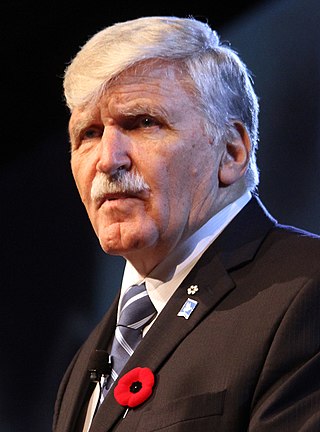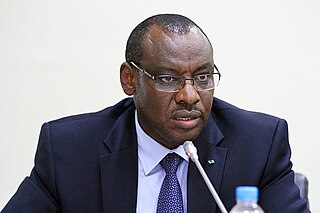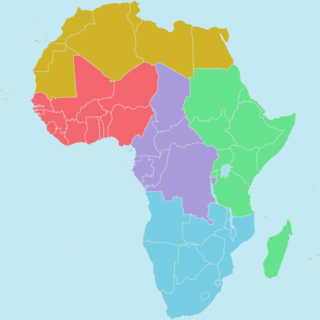
Kigali is the capital and largest city of Rwanda. It is near the nation's geographic centre in a region of rolling hills, with a series of valleys and ridges joined by steep slopes. As a primate city, Kigali is a relatively new city. It has been Rwanda's economic, cultural, and transport hub since it was founded as an administrative outpost in 1907, and became the capital of the country at independence in 1962, shifting focus away from Huye.

Roméo Antonius Dallaire is a retired Canadian politician and military officer who was a senator from Quebec from 2005 to 2014, and a lieutenant-general in the Canadian Armed Forces. He notably was the force commander of UNAMIR, the ill-fated United Nations peacekeeping force for Rwanda between 1993 and 1994, and for trying to stop the genocide that was being waged by Hutu extremists against Tutsis. Dallaire is a Senior Fellow at the Montreal Institute for Genocide and Human Rights Studies (MIGS) and co-director of the MIGS Will to Intervene Project.

The United Nations Economic Commission for Africa was established in 1958 by the United Nations Economic and Social Council to encourage economic cooperation among its member states following a recommendation of the United Nations General Assembly. It is one of five regional commissions.

The Rwanda Defence Force is the military of the Republic of Rwanda. The country's armed forces were originally known as the Forces armées rwandaises (FAR), but following the Rwandan Civil War of 1990–1994 and the 1994 Genocide against the Tutsi, the victorious Rwandan Patriotic Front (Inkotanyi) renamed it the Rwandan Patriotic Army (RPA), its army name during the struggle of 1990–1994. Later, it was renamed to its current name.
The United Nations Human Settlements Programme (UN-Habitat) is the United Nations programme for human settlements and sustainable urban development. It was established in 1977 as an outcome of the first United Nations Conference on Human Settlements and Sustainable Urban Development held in Vancouver, Canada, in 1976. UN-Habitat maintains its headquarters at the United Nations Office at Nairobi, Kenya. It is mandated by the United Nations General Assembly to promote socially and environmentally sustainable towns and cities with the goal of providing adequate shelter for all. It is a member of the United Nations Development Group. The mandate of UN-Habitat derives from the Habitat Agenda, adopted by the United Nations Conference on Human Settlements in Istanbul, Turkey, in 1996. The twin goals of the Habitat Agenda are adequate shelter for all and the development of sustainable human settlements in an urbanizing world.

An under-secretary-general of the United Nations (USG) is a senior official within the United Nations System, normally appointed by the General Assembly on the recommendation of the secretary-general for a renewable term of four years. Under-secretary-general is the third highest rank in the United Nations, after the secretary-general and the deputy secretary-general. The rank is held by the heads of different UN entities, certain high officials of the United Nations Secretariat, and high-level envoys. The United Nations regards the rank as equal to that of a cabinet minister of a member state, and under-secretaries-general have diplomatic immunity under the UN Charter.
Rayon Sports Football Club is an association football club from Nyanza, Southern province, Rwanda, now based in Kigali. The team currently competes in the Rwanda National Football League, and plays its home games at the Stade Amahoro in Kigali and Kigali Pele Stadium, Nyamirambo. For some years, its daily operations were held in the southern province in Nyanza District. They've won 9 Rwandan Premier League titles, the 2nd most Premier League titles. Throughout its history, the club has won 9 Rwandan Cups, 1 CECAFA Clubs' Cup, 9 peace Cups, 3 Agaciro Cups, 2 Intwali Cups and a Kigali 100 Years' Cup and 1 Father Fraipont memorial tournament.

The Kivu conflict is an umbrella term for a series of protracted armed conflicts in the North Kivu and South Kivu provinces in the eastern Democratic Republic of the Congo which have occurred since the end of the Second Congo War. Including neighboring Ituri province, there are more than 120 different armed groups active in the eastern Democratic Republic of Congo. Currently, some of the most active rebel groups include the Allied Democratic Forces, the Cooperative for the Development of the Congo, the March 23 Movement, and many local Mai Mai militias. In addition to rebel groups and the governmental FARDC troops, a number of national and international organizations have intervened militarily in the conflict, including the United Nations force known as MONUSCO, and an East African Community regional force.
Inga Björk-Klevby, is the former United Nations Deputy Executive Director of the United Nations Human Settlements Programme (UN-HABITAT). She was appointed to this position by United Nations Secretary-General Kofi Annan in October 2005.
Sir Charles James Petrie, 6th Baronet, OBE is a United Nations diplomat. A former investment banker and management consultant, he then worked for the United Nations, before going independent.

Pierre-Damien Habumuremyi is a Rwandan politician who served as Prime Minister of Rwanda from 7 October 2011 until 24 July 2014. He previously served as Minister of Education from May 2011 to October 2011.

Claver Gatete is a Rwandan politician and diplomat who has been serving as the Executive Secretary of the United Nations Economic Commission for Africa since 2023.

The member states of the African Union (AU) are divided into five geographical regions.
Jules Mutebutsi, also known as Jules Mutebusi and Jules Mutebuzi, was a Congolese military person and rebel leader of the Rally for Congolese Democracy. He has been often described as a Rwandan proxy. Mutebutsi was captured in 2004 and was put on trial for treason. He was soon sentenced to exile. He would remain in exile until his death in 2014.
Arcot Ramachandran (1923-2018) was an Indian scientist, anthropologist, author and a former Under-Secretary General of United Nations Centre for Human Settlements, known for his scholarship on the subjects of heat and mass transfer and environment and his social commitment to the cause of sustainable development. The Government of India honoured him in 2003, with the Padma Bhushan, the third highest civilian award, for his services to the fields of Science and Engineering.
University of Rwanda is a public collegiate, multi campus university based in Kigali, Rwanda. Formed in 2013 through the merger of previously independent education institutions, the University of Rwanda is the largest education institution in Rwanda. The University of Rwanda is ranked number one in the country by the Higher Education Council, an organ established by the Government of Rwanda.
Libérat Mfumukeko is a Burundian diplomat and civil servant. He is currently an IDA / World Bank Borrowers’ Representative where he co-chairs the Africa Group 1, and is also a [[Chargé de Missions] at the Office of the President of the Republic of Burundi. From 2016 to 2021, he was the Secretary General of the East African Community (EAC). During his term at EAC, he presided over the Tripartite EAC-COMESA-SADC in 2016-2017, served as an ex-officio member of the East African Legislative Assembly (EALA) and of the African Union Executive Council. Before 2016, Amb. Mfumukeko was the EAC Deputy Secretary in charge of Finance and Administration. From 2009 to 2015, he held high-profile positions in Burundi; he was the first Director General of the Burundi Investment Promotion Agency (2009-2012), the Principal Advisor to the President of the Republic of Burundi in charge of Economic Affairs (2012-2013), and the Director General of REGIDESO (2013-2015), the largest state-owned company in Burundi which main activities are production and distribution of water and electricity. Between 1994 and 2009, Amb. Mfumukeko held various managerial positions in the private sector in France and the USA where he studied and lived for more than 20 years, and he was an Economic Expert at the United Nations for 5 years. Amb. Mfumukeko holds a Bachelor Degree in Economics from the University of Tours (France), an MBA from Clark University, a Post-graduate Certificate in Adaptive Leadership from the Kennedy School of Government, and a Diploma in Russian Language from the Lomonossov Moscow State University (Russia). In 2021, Clark University granted him a Doctoral Degree Honoris Causa. Since 2013, Amb. Libérat Mfumukeko has been the founder and president of the NGO “Excellence in Education for Development” which operates Bujumbura International University.
The following is a timeline of the history of the city of Kigali, Rwanda.

Dato' Seri Maimunah binti Mohd Sharif is a Malaysian civil servant and urban planner who has been serving as the 15th Mayor of Kuala Lumpur since August 2024. She also served as the Executive Director of the United Nations Human Settlements Programme (UN-Habitat) since January 2018 until January 2024, becoming the first Asian woman to serve as Executive Director of UN-Habitat. On 20 January 2022, she was re-elected by the UN General Assembly for a two-year term that ends on 19 January 2024.
Victor Kisob is the former Deputy Executive Director of the United Nations Human Settlements Programme UN-HABITAT at the level of UN Assistant Secretary-General. He was appointed as Deputy Executive Director on 25 July 2018 by the United Nations Secretary-General António Guterres.










